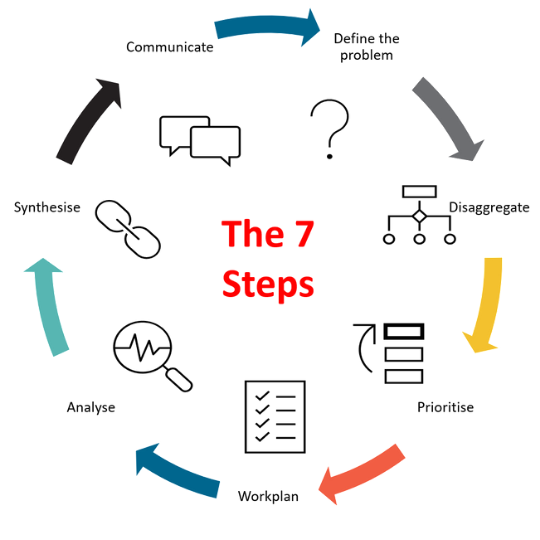Problem solving is undoubtedly a crucial CEO issue. In fact, the World Economic Forum lists complex problem solving as one of the top 10 critical skills.
Additionally, research tangibly demonstrates companies with strong problem-solving capability have a 3.5 times higher return to shareholders and stakeholders.
Coraggio’s CEO, Richard Skarzynski has observed,
“When I’ve assessed what corporate success involves over the years, it is abundantly clear it is increasingly a function of people assets rather than physical assets and this people asset emphasis the requirement to be on problem solving capability and teamwork.”
Why has problem solving become a CEO issue? And what should CEOs do about it?
Former Chairman and CEO of Google, Eric Schmidt says,
“We always hired for creative problem solving talent above all else.”
However, the irony is there’s no training in schools or universities providing requisite skills in problem solving and yet, particularly during a transitional period, it is a significantly increased requirement due to the abundance of complex problems and disruption in business models.
This is the very essence of a compelling argument why problem solving has been elevated to the C-suite, because the challenges facing CEOs are not only larger and more complex, however business models are rapidly becoming disrupted and changing faster than ever before. This has extrapolated since the global pandemic.
Coraggio Chair and highly respected leading business leader Bill Crichton cited,
“I used to see effortlessly around corners, however now the landscape is blurred. CEOs need to focus on setting priorities and taking appropriate action.”
McKinsey uses a survey tool to encourage companies to employ a systematic 7 step process to define the problem, disaggregate and prioritise, build a workplan and team norms, conduct analysis, synthesise findings and communicate them in a way that leads to effective action and positive outcomes:
How the best problem solvers crack the code
Great problem solvers are made, not born. Leaders who typically adopt a particularly curious mindset to address, with an open mind, even the most insurmountable challenges by demonstrating a healthy level of curiosity regarding every element of the problem with an eagle-eye view.
These people harness a mission of discovery and acknowledge they may need to tap into collective intelligence, even if the sharpest people are not in the room.
Effective creativity stems from an inert curiosity regarding the diverse array of potential answers. However, typically as adults we have forgotten our inquisitive nature we possessed in childhood.
We tend to stop asking. Instead, research findings illustrate that as adults, our brains have developed to make logical sense of the numbers and consider patterns.
Author and economist Caroline Webb cites to generate more curiosity amongst team problem solving is to put a question mark behind your initial hypothesis or first-cut answers. This small artifice is surprisingly powerful: it tends to encourage multiple solution paths positioning the focus, correctly, on assembling evidence. For example, Why is this solution better? Why not that one?
Curiosity is the engine of creativity
Better results come from embracing curiosity and uncertainty, however the real world is already highly uncertain and tenuous.
Recent research demonstrates we are now better at solving problems when we think in terms of odds rather than certainties. For example, the impact of COVID-19 we’ve clearly addressed the health and economic impact with almost no prior knowledge. We have to be comfortable with estimating probabilities to make good decisions, even when these guesses are imperfect.
Embracing imperfection can lead to more effective problem solving – a requirement in situations of high uncertainty. Afterall, the mindsets of great problem solvers are just as important as the methods they employ.
Remember show and tell at school? Show and tell is how you connect your audience with the problem and then use combinations of logic and persuasion to get action – even if it’s not perfect.
Then find a way to present your logic visually and present the argument emotionally as well as logically. This mindset transparently invites decision makers into a problem-solving domain you have created. The end-game potentially unearths a lateral-thinking solution.
Coraggio guarantees you're never lonely at the top
CEOs can feel alone at the top, however they need to get out of their own “lockdown.” How else will you know whether your teams are across what you’re doing? Who will provide feedback on your management decisions? An old joke in the military regarding those who made the prestigious title of a general or admiral are told: “Congratulations. You’ll never eat poorly again. And you’ll never hear the truth again.” That’s also the risk for CEOs.
Never before has it been more imperative CEOs acknowledge their strengths and pace themselves, implementing effective time management is critical.
In addition, COVID has flattened companies, generating a new style of management which has increased the intensity of communication, including to tuning in to all the company’s stakeholders. This is a revealing test of leadership! As a result CEOs are engaging more with colleagues, employees and other constituents.
In conclusion, the guide for a CEO to become a more effective problem solver is to recognise a cohesive, engaged team is paramount and to achieve this, they need to invest more time on the front line to improve the bottom line. As a result, these CEOs are emerging strengthened, compassionate, confident and forward looking – setting aside explicit time to think about what’s next to improve performance and accelerate change.
What is Coraggio?
Operating a business typically presents complex issues to deal with, sometimes on a daily basis. Imagine if you could leverage the experience from an extensive group of industry peers to improve your decision making and future proof a sustainable business, whilst being held accountable?
Also imagine if you gained the peace of mind to seamlessly access these answers and navigate other business challenges, simply by connecting with entrepreneurs and business leaders? This is the strength of peer to peer and leadership mentoring.
Coraggio offers a mutual exchange of expertise, ideas and support system enabling you to capitalise on a give-and-take dynamic amongst advisors who have walked the path before mitigating risk to your business.
Coraggio Chairs are industry leaders, members are forward-thinking advisors and all Boards are dedicated to the ongoing success of their fellow member’s businesses, offering Fearless Objective Advice – that’s the Coraggion Spirit!
In the words of Henry Ford “If everyone is moving forward together, then success takes care of itself”.
Would you like to be a part of this?
Become an integral Member of a confidential group of business owners sharing their insights and experiences for the benefit of your business? Imagine how your business would prosper from connecting with a broader community consisting of more than 400 high performing and driven industry leaders!
Explore Membership today! Find out how our proven program can assist you build a better business and become a better leader.


